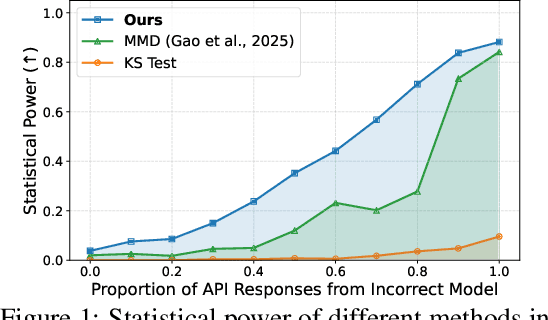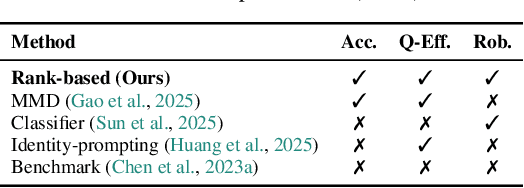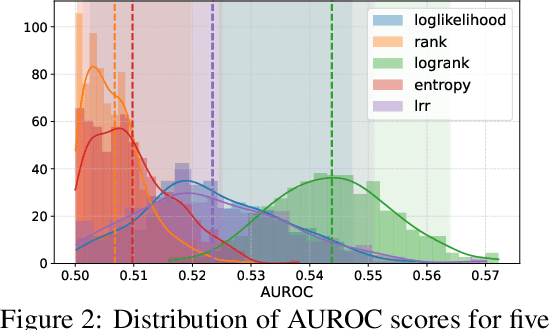Yaowen Ye
Auditing Black-Box LLM APIs with a Rank-Based Uniformity Test
Jun 08, 2025



Abstract:As API access becomes a primary interface to large language models (LLMs), users often interact with black-box systems that offer little transparency into the deployed model. To reduce costs or maliciously alter model behaviors, API providers may discreetly serve quantized or fine-tuned variants, which can degrade performance and compromise safety. Detecting such substitutions is difficult, as users lack access to model weights and, in most cases, even output logits. To tackle this problem, we propose a rank-based uniformity test that can verify the behavioral equality of a black-box LLM to a locally deployed authentic model. Our method is accurate, query-efficient, and avoids detectable query patterns, making it robust to adversarial providers that reroute or mix responses upon the detection of testing attempts. We evaluate the approach across diverse threat scenarios, including quantization, harmful fine-tuning, jailbreak prompts, and full model substitution, showing that it consistently achieves superior statistical power over prior methods under constrained query budgets.
Iterative Label Refinement Matters More than Preference Optimization under Weak Supervision
Jan 14, 2025Abstract:Language model (LM) post-training relies on two stages of human supervision: task demonstrations for supervised finetuning (SFT), followed by preference comparisons for reinforcement learning from human feedback (RLHF). As LMs become more capable, the tasks they are given become harder to supervise. Will post-training remain effective under unreliable supervision? To test this, we simulate unreliable demonstrations and comparison feedback using small LMs and time-constrained humans. We find that in the presence of unreliable supervision, SFT still retains some effectiveness, but DPO (a common RLHF algorithm) fails to improve the model beyond SFT. To address this, we propose iterative label refinement (ILR) as an alternative to RLHF. ILR improves the SFT data by using comparison feedback to decide whether human demonstrations should be replaced by model-generated alternatives, then retrains the model via SFT on the updated data. SFT+ILR outperforms SFT+DPO on several tasks with unreliable supervision (math, coding, and safe instruction-following). Our findings suggest that as LMs are used for complex tasks where human supervision is unreliable, RLHF may no longer be the best use of human comparison feedback; instead, it is better to direct feedback towards improving the training data rather than continually training the model. Our code and data are available at https://github.com/helloelwin/iterative-label-refinement.
Graph Transformer for Recommendation
Jun 04, 2023



Abstract:This paper presents a novel approach to representation learning in recommender systems by integrating generative self-supervised learning with graph transformer architecture. We highlight the importance of high-quality data augmentation with relevant self-supervised pretext tasks for improving performance. Towards this end, we propose a new approach that automates the self-supervision augmentation process through a rationale-aware generative SSL that distills informative user-item interaction patterns. The proposed recommender with Graph TransFormer (GFormer) that offers parameterized collaborative rationale discovery for selective augmentation while preserving global-aware user-item relationships. In GFormer, we allow the rationale-aware SSL to inspire graph collaborative filtering with task-adaptive invariant rationalization in graph transformer. The experimental results reveal that our GFormer has the capability to consistently improve the performance over baselines on different datasets. Several in-depth experiments further investigate the invariant rationale-aware augmentation from various aspects. The source code for this work is publicly available at: https://github.com/HKUDS/GFormer.
Graph Masked Autoencoder for Sequential Recommendation
May 09, 2023Abstract:While some powerful neural network architectures (e.g., Transformer, Graph Neural Networks) have achieved improved performance in sequential recommendation with high-order item dependency modeling, they may suffer from poor representation capability in label scarcity scenarios. To address the issue of insufficient labels, Contrastive Learning (CL) has attracted much attention in recent methods to perform data augmentation through embedding contrasting for self-supervision. However, due to the hand-crafted property of their contrastive view generation strategies, existing CL-enhanced models i) can hardly yield consistent performance on diverse sequential recommendation tasks; ii) may not be immune to user behavior data noise. In light of this, we propose a simple yet effective Graph Masked AutoEncoder-enhanced sequential Recommender system (MAERec) that adaptively and dynamically distills global item transitional information for self-supervised augmentation. It naturally avoids the above issue of heavy reliance on constructing high-quality embedding contrastive views. Instead, an adaptive data reconstruction paradigm is designed to be integrated with the long-range item dependency modeling, for informative augmentation in sequential recommendation. Extensive experiments demonstrate that our method significantly outperforms state-of-the-art baseline models and can learn more accurate representations against data noise and sparsity. Our implemented model code is available at https://github.com/HKUDS/MAERec.
 Add to Chrome
Add to Chrome Add to Firefox
Add to Firefox Add to Edge
Add to Edge